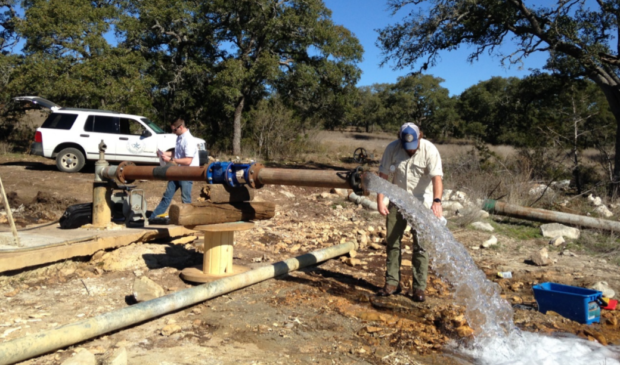Conservation district denies rehearing request on Needmore well permit
Thursday, December 19, 2019 by
Ryan Thornton The Barton Springs/Edwards Aquifer Conservation District denied a request at its Dec. 12 meeting from the Trinity Edwards Springs Protection Association for a rehearing of the Needmore Water LLC permit.
In July, the district’s board of directors granted the Needmore permit to pump over 289 million gallons per year from the Trinity Aquifer.
At the time, Vanessa Puig-Williams of the Trinity Edwards Springs Protection Association argued that Needmore was not eligible for the application under the protections of House Bill 3405, because the well was not presently in operation when the bill went into effect in June 2015. HB 3405 limits the district’s regulatory power over groundwater pumping on private lands that were newly incorporated into the district’s expanded regulatory boundaries in 2015.
Following the legal interpretation of Bill Dugat, attorney to the district’s general manager, board members said they had no legal option but to grant the permit as Needmore’s application qualified for protection under HB 3405.
“The 2015 law made clear that Needmore was entitled to this permit for its existing well. We didn’t write the law, but we took an oath to uphold it,” said Blayne Stansberry, director and president of the board, at the meeting last week.
Following the decision, Puig-Williams told the Austin Monitor that her organization is looking at every possible legal avenue to reverse the decision. On Oct. 2, the organization filed a motion for rehearing, followed by a response from Needmore on Oct. 31.
In its motion, the organization called the board’s decision “arbitrary and capricious, an abuse of discretion, and contrary to constitutional rights of landowners.” The motion reiterated the organization’s view that the board had misinterpreted HB 3405 and that, far from being protected by the bill, Needmore’s application was ineligible from the start. It further argued that the board’s position “deprives affected landowners from protecting their constitutionally protected property rights.”
At the board meeting, however, Stansberry said the motion offered no new information that would justify a second hearing. She recalled that the same arguments had been made by many people during the five-hour public hearing on Needmore’s application in July.
“I do not like the outcome and personally find it offensive that one landowner can pump so much groundwater in an area like Hays County where water is scarce,” said Board Member Mary Stone. “But our hands were tied by the Legislature on this permit application.”
Stone urged Puig-Williams and her organization to refrain from appealing the decision to district court, noting that the Needmore permit is a consequence of particular circumstances resulting from the district’s expansion in 2015 and is the only large permit that was filed under HB 3405.
“The district really needs to be spending its limited funds on monitoring the aquifer levels in this area to protect Hays County landowners under the special conditions included in the permit – not on costly litigation that would ultimately lead to the same result or perhaps worse, if a judge were to remove the special conditions we included to protect the aquifer and existing wells,” Stone said.
Stansberry said that, while it may have been popular for the board to deny the permit despite state law, it would have resulted in wasted taxpayer money.
“A permit denial would have led to costly litigation using public money, which would clearly have been overturned by a court in light of the controlling law,” she said. “We just have to be more financially responsible than that with public funds.”
Needmore’s permit for over 289 million gallons a year is the maximum amount that the company was eligible to request. Residents who rely on the Trinity Aquifer and surrounding aquifers for their own private use have questioned the company’s motive for requesting the maximum pumping capacity when the only permitted use is wildlife management and agricultural purposes on its 5,000-acre ranch on the Blanco River. Greg LaMantia, owner of the property, did not explain what specific use the maximum pumping volume would serve or suggest other plans for the property beyond wildlife and agriculture during July’s public hearing and vote.
“There will never be another permit like this,” Stone added. “Thankfully, the board will have much more discretion under the law in granting or denying applications for other large water well permits in the future.”
Photo courtesy of Barton Springs/Edwards Aquifer Conservation District.
The Austin Monitor’s work is made possible by donations from the community. Though our reporting covers donors from time to time, we are careful to keep business and editorial efforts separate while maintaining transparency. A complete list of donors is available here, and our code of ethics is explained here.
You're a community leader
And we’re honored you look to us for serious, in-depth news. You know a strong community needs local and dedicated watchdog reporting. We’re here for you and that won’t change. Now will you take the powerful next step and support our nonprofit news organization?








